Definition
Copyright protects artistic, literary and scientific works ranging from books, music, paintings, sculpture and films, to computer programmes, databases, advertisements, maps and technical drawings. Such protection covers both original and derivative works (e.g. adaptations, compilations, transformations, translations or arrangements).
However, only the form in which the ideas of the author are described, explained, illustrated or incorporated in the works shall be protected by copyright. The ideas contained in literary and artistic works, the technical content of scientific works or the industrial or commercial exploitation thereof do not benefit from this IPR protection.
Resources about copyright
European IP Helpdesk
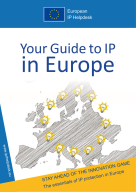
Intellectual property (IP) management is a key element in improving the competitiveness of any company.

On 15 April 2019, the European Council approved the Directive on Copyright and Related Rights in the Digital Single Market.
China IP Helpdesk
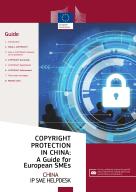
Copyright is a form of intellectual property that protects a creator’s exclusive right to control who reproduces or alters the product of their original creative effort.
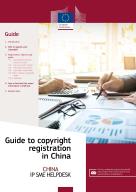
Copyright protects original creative expressions of ideas that subsist in a fixed medium such as on a piece of paper, on an artist’s canvas, on a disc, or on magnetically recordable media. Copyrightable expressions are known as “works”.
India IP Helpdesk
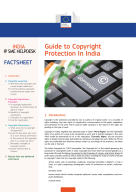
This factsheet will introduce the copyright protection regime which applies in India to the reader.
Latin America IP Helpdesk

Copyright in a nutshell

Factsheet (12 pages)
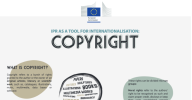
Infographic (1 page)
South-East Asia IP Helpdesk
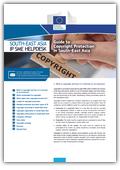
Explore our comprehensive 'Guide to copyright protection in South-East Asia': covering copyright basics, registration processes, and enforcement mechanisms across South-East Asia, it’s the key to safeguarding your copyrights effectively.
Copyright protects any literary, scientific or artistic works: books, music, papers, videos, blog-posts, pictures, etc. are some examples of works that can be protected by copyrights.
In Argentina, intellectual property of works belongs to the creators for their entire life and to their beneficiaries or assigns for 70 years calculated from January 1st of the year after the creator’s death.
In Brazil, creators’ economic rights shall be protected for 70 years calculated from January 1st of the year after the creator’s death, subject to the order of succession under civil law.
In Chile, copyright protection is guaranteed for the creator’s entire life and lasts 70 more years after his/her death.
In Paraguay, economic rights last for the creator’s entire life and 70 years after his/her death.
In Uruguay, the creator is holder of the copyright for his whole life and his beneficiaries or assigns are holders of the copyright for 50 years after the creator’s death.
In Venezuela, copyright lasts for the creator’s entire life and expires after 60 years calculated from January 1st of the year after his/her death, even concerning works not disclosed during his/her life.
Copyright protection is automatic in the EU, as well as in every country that is a signatory to the Berne Convention. Copyright, therefore, arises from the moment of the work’s creation and no registration or other formality is required.
Nevertheless, copyright owners may take some measures with the purpose of informing others of the existence of a copyright, reducing the likelihood of a potential infringement. A well-known measure commonly used is to mark copyrighted works with a copyright notice. Usually it includes the copyright symbol (©), followed by the owner’s name and year of the work’s protection.
Even though copyright owners do not have to register copyright, and registration is not a requirement for protection, some national laws allow it. Using these non-mandatory registration systems may prove to be useful in some situations, particularly where proof of possession and creation on a certain date is necessary to legal proceedings. It may also prevent misappropriations of information in negotiations with potential partners, since it shows that said material had already been created.
In the EU, copyright is generally owned by the natural person who creates the work. In most EU countries, the author or co-authors of a work are the first owners or co-owners of the copyright.
However, the IP systems in the EU currently vary between member states that maintain a system of institutional ownership, and those which maintain a system of professor’s privilege (inventor ownership).
In many countries, when a work is made by an employee in the course of his/her employment, the owner of the work will be stipulated in the employee's contract, usually that the employer owns the any work created in the due course of employment.(e.g. the university would be regarded as the owner of a copyright to a work created by its researcher in the course of their employment, since the latter is paid to perform such a task).
Some countries of the EU have a specific type of "professor’s privilege" regime according to which the researchers, PhD students, etc. are entitled by law to the ownership of the work they created in the course of their employment (e.g. in Italy or Sweden). Results of publicly funded research created or developed by researchers are thus owned by the latter and not by the academic institution where the research is carried out.
Yes, it is highly advisable to register your copyright in China. Bad faith registrations are easy to obtain in the Chinese Copyright Office and taking down a bad faith registration requires going to People's Courts (facing a several years long trial).
Also, Copyright registration will allow your company to enforce it with the Internet Courts, which have special jurisdiction in online copyright infringement. Internet Courts are fast and cheaper than People's Courts making the eventual enforcement significantly more efficient.
As part of the Berne Convention, Brazil does not require any formal registration obligation, the work will be automatically protected from the moment of its creation. Nevertheless, under certain circumstances, it is advisable to register the work, especially to enforce it.
In accordance with Indonesian law and in contrary to most European legislations, the copyright for works created by an employee, even in the course of employment, do not automatically belong to the employer. The ownership regime of the works created in the course of employment will be regulated within the employment contract you establish with your employees.
There is no formal requirement for the work to be registered in order for copyright to be claimed or recognised. However, a copyright owner may voluntarily register their copyright in Malaysia. Registration is still advisable for foreign SMEs as the registration can be extremely useful in enforcement proceedings to provide evidence of your ownership. To claim copyright ownership (i.e. to forewarn infringement), a notice with the symbol © may also be placed in/on the work followed by the name of the owner and the year of first publication.
Latest news
Today, the European Patent Office (EPO) released the Patent Index 2024, which shows that innovation remains strong, with patent applications last year keeping up the high level observed in 2023.
The Licensing Executives Society International (LESI) is pleased to unveil this special edition of les Nouvelles, focusing on Standard Essential Patents (SEPs).

Applications are now open for the 2026 European Capital of Innovation Awards. Cities are invited to submit their applications by 18 June 2025, 17:00 (CET).

Apply for the Ideas Powered for Business SME Fund 2025!

In this post, we look at the General Court's decision in case T-1187/23 on what genuine use of a trade mark means, and whether use of the trade mark in relation to a finished project satisfies the requirement when the trade mark has been registered for the raw products.
